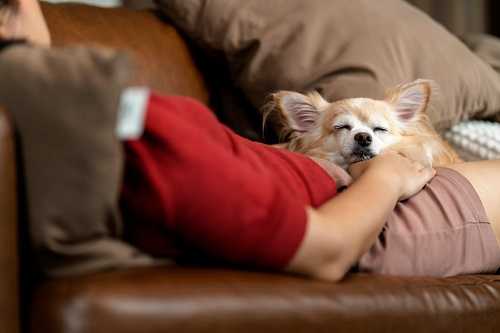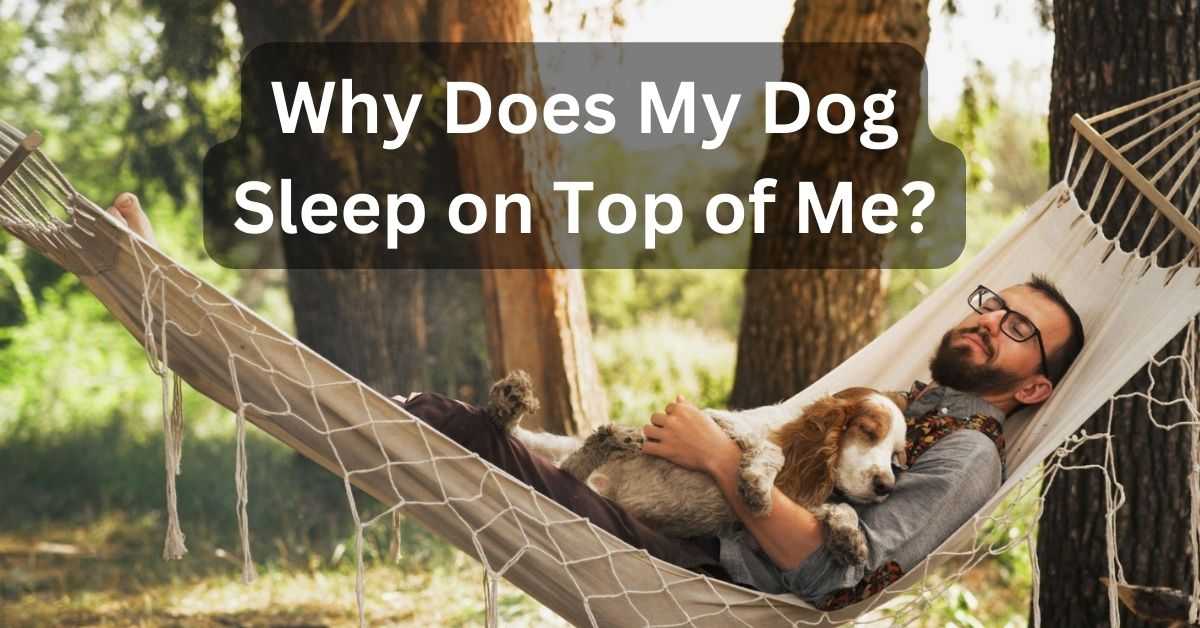When your dog settles on your lap or chest for a nap, you’re not the only one who’s surprised or confused. Although it may seem strange that dogs sometimes prefer to sleep close to their owners–sometimes on top of them–there are many good reasons why they do this. This blog post will explore Why My Dog Sleeps on Top of you and what you can do if it becomes uncomfortable.
Why Does My Dog Sleep on Top of Me?
It’s a familiar scene to many pet owners – their pup snuggling up on their lap or chest with its full weight. But why do dogs like to sleep on top of us?
Dogs may find sleeping on their humans comforting for a variety of reasons. The most common reason is that it provides them with security and safety. When your pup sleeps on top of you, they feel like the alpha – or at least it feels like it.
In addition, some dogs may find warmth and comfort in this form of snuggling up. Humans stay warm longer than their furry counterparts, so your pup may be looking for extra warmth.
Finally, some dogs may enjoy the closeness and attention associated with sleeping on top of their owners. It’s no surprise that our four-legged friends love us so much – there’s nothing like a good snuggle session to make them feel loved! Teach Them How To Kiss and Snuggle!

Likewise, if your pup is trying to crawl on top of you as you relax, don’t be too quick to stop them. After all, there’s nothing quite like a good cuddle with your pup!
So the next time your pup tries to take over your lap, remember that it may just be their way of showing you how much they care. Please give them a good belly rub and another snuggle, and your pup will undoubtedly be happy!
Also, Find Out: Why Do Dogs Roll on Their Toys?
Common Reasons Why Your Dog Lays on Top of You
Here are some of the most common reasons that your dog may enjoy sleeping on top of you:
- Comfort Dogs often look for soft, comfortable surfaces to sleep on. If you are lying down, your body may provide a warm and comfortable spot for them to rest their head.
- Protection: Dogs often feel safer when they can be close to their beloved owner, and your body can provide them with a sense of security.
- Affection: Many dogs enjoy laying on top of their beloved owners because it allows them to show them extra affection—like telling you “I love you” in canine language!
- Attention: If your dog enjoys snuggling up with you, it may be because they’re looking for extra attention and love.
- Heat: Some breeds of dogs, such as greyhounds, have thinner fur coats that are not suited to cold climates. Laying on top of you can provide them extra warmth and comfort in the winter.
Other Dog-Related Article: Are Dogs Immune to Tear Gas?
How to Stop Your Dog from Sleeping on Top of You?
Dog owners enjoy having their furry friends curl up and sleep on them. However, if your pup’s sleeping habits are becoming uncomfortable or intrusive, you may want to make some changes.
The most important thing to remember is that your dog is looking for comfort and safety when they climb on top of you. If your pup is feeling anxious or unsettled, it may try to seek comfort by sleeping on top of you to calm down. Therefore, it’s important to look for ways to reduce stress in your pup so that they don’t need to sleep on top of you.
If your dog has left sleeping in the crate, you can reduce stress in your pup by providing them with a comfortable place to sleep. This could be a bed or blanket you provide so they have a secure and safe place to sleep. Some dogs tend to sleep in crates for a long time. If you are facing the same problem, read When Puppy Ready to Sleep Out Of Crate Is? Also, make sure that there are no disturbances when they sleep, such as loud noises or too much movement.
Another way to reduce stress and keep your pup from reaching for your bed or couch is by giving them plenty of exercise during the day. Regular walks, playtime, and other activities will help tire them out, so they’re less likely to seek comfort from you when it comes time to rest.

FAQs – Why Does My Dog Sleep on Top of Me
Even though providing your pup with plenty of love and attention will likely make them feel contented, it isn’t likely to be a major factor in preventing them from sleeping on top of you. Dogs are naturally inclined to seek comfort when feeling anxious or unsettled, so providing more attention won’t necessarily address the underlying cause of their behaviour.
If your pup continues to sleep on top of you even after implementing these strategies, it may be time to consult a veterinarian or dog trainer. They can offer professional advice on how to address this behaviour best and help you create a plan to teach your pup better sleeping habits.
Yes, there are potential health risks when your pup sleeps on top of you. For instance, having a pet nearby can cause further complications if you have allergies or asthma. Additionally, if your pup is particularly heavy, its weight could be a source of discomfort or even injury. For these reasons, it’s important to be mindful of how your pup sleeps and take steps to create a comfortable environment.
Final Verdict
In conclusion, there are several reasons why your dog may be sleeping on top of you – from providing them with a sense of security to seeking extra attention and warmth. Although this behaviour can be endearing for many pet owners, it’s important to take steps to prevent it if the habit becomes intrusive or uncomfortable.
Your pup can reduce stress levels that can lead to unwanted sleep habits if you provide their bedding in a peaceful environment and give them plenty of exercise during the day. For additional advice on addressing this issue, consult a veterinarian or trainer if these methods do not work.
